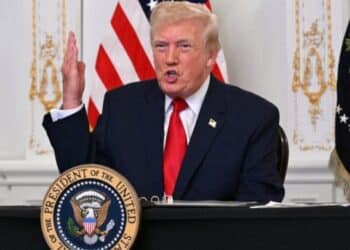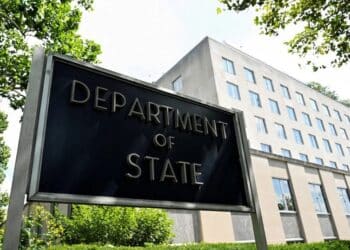The United States and Colombia, long-close partners in anti-narcotics efforts, clashed Sunday over the deportation of migrants and imposed tariffs on each other’s goods in a show of what countries could face if they intervened in the Trump administration’s crackdown on illegal immigration.
Presidents Donald Trump and Gustavo Petro, in a series of social media posts, defended their views on migration, with the latter accusing Trump of not treating immigrants with dignity during deportation and announcing a retaliatory 25% increase in Colombian tariffs on U.S. goods.
Earlier, the U.S. president had ordered visa restrictions, 25% tariffs on all Colombian incoming goods, which would be raised to 50% in one week, and other retaliatory measures sparked by Petro’s decision to reject two Colombia-bound U.S. military aircraft carrying migrants.
Trump said the measures were necessary because Petro’s decision “jeopardized” national security in the U.S.
“These measures are just the beginning,” Trump wrote on his social media platform Truth Social. “We will not allow the Colombian Government to violate its legal obligations with regard to the acceptance and return of the Criminals they forced into the United States.”
After Trump’s announcement, Petro posted on X that he had ordered the “foreign trade minister to raise import tariffs from the U.S. by 25%.”
Colombia has traditionally been the U.S.’s top ally in Latin America. But their relationship has strained since Petro, a former guerrilla, became Colombia’s first leftist president in 2022 and sought distance from the U.S.
According to Witness at the Border, an advocacy group that tracks flight data, Colombia accepted 475 deportation flights from the U.S. from 2020 to 2024, fifth behind Guatemala, Honduras, Mexico, and El Salvador. It accepted 124 deportation flights in 2024.
Colombia is also among the countries that began accepting U.S.-funded deportation flights from Panama last year.
The U.S. government didn’t immediately respond to a request for comment from The Associated Press regarding aircraft and protocols used in deportations to Colombia.
“This is a clear message we are sending that countries have an obligation to accept repatriation flights,” a senior administration official told AP. The official spoke on the condition of anonymity because they were not authorised to discuss issue publicly.
U.S. Secretary of State Marco Rubio in a statement said Petro “canceled his authorization” for the flights when the aircraft were in the air.
As of Sunday afternoon, no official order has been issued to allow the implementation of the measures Trump announced.
A State Department spokesperson confirmed to AP the agency suspended processing visas at the U.S. Embassy in Colombia’s capital, Bogota, “in direct response to President Petro’s decision to not accept repatriation flights of Colombian citizens.”
Colombians emerged in recent years as a major presence on the U.S. border with Mexico, aided partly by a visa regime that allows them to easily fly to Mexico and avoid trekking though the treacherous Darien Gap. They ranked fourth with 127,604 arrests for illegal crossings during 12 months through September, behind Mexicans, Guatemalans and Venezuelans.
Mexico hasn’t imposed visa restrictions on Colombians, as they have on Venezuelans, Ecuadoreans and Peruvians.










